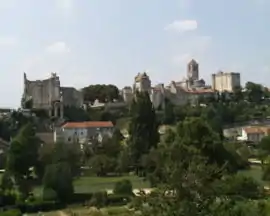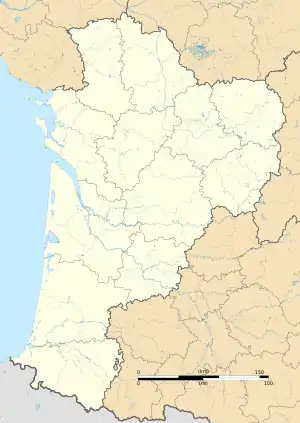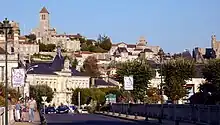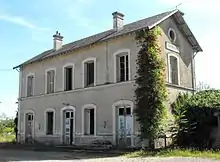Chauvigny
Chauvigny (French pronunciation: [ʃoviɲi]; Poitevin: Chôvigni) is a commune in the Vienne department in the Nouvelle-Aquitaine region in western France.
Chauvigny | |
|---|---|
 A general view of Chauvigny | |
.svg.png.webp) Coat of arms | |
Location of Chauvigny | |
 Chauvigny  Chauvigny | |
| Coordinates: 46°34′10″N 0°38′51″E | |
| Country | France |
| Region | Nouvelle-Aquitaine |
| Department | Vienne |
| Arrondissement | Montmorillon |
| Canton | Chauvigny |
| Intercommunality | CU Grand Poitiers |
| Government | |
| • Mayor (2020–2026) | Gérard Herbert[1] |
| Area 1 | 95.82 km2 (37.00 sq mi) |
| Population | 7,084 |
| • Density | 74/km2 (190/sq mi) |
| Time zone | UTC+01:00 (CET) |
| • Summer (DST) | UTC+02:00 (CEST) |
| INSEE/Postal code | 86070 /86300 |
| Elevation | 61–149 m (200–489 ft) |
| 1 French Land Register data, which excludes lakes, ponds, glaciers > 1 km2 (0.386 sq mi or 247 acres) and river estuaries. | |
Chauvigny is located 20 miles (32 km) east of Poitiers by rail. The town is situated overlooking the river Vienne and a small brook. Chauvigny is twinned with Billericay in Essex, England.
The composer Fernand Lamy (1881–1966) was born in Chauvigny.
Chauvigny was among the places visited by Roger Fry the British artist, art critic and member of the Bloomsbury group in October 1911 when, after his visit to Paris to see the Salon d’Automne, he joined Clive Bell (husband of the celebrated English artist Vanessa Bell) and Duncan Grant (also a celebrated English artist) on a bicycle tour of the region to explore Romanesque churches. Fry produced a charming painting of Chauvigny
Population
| Year | Pop. | ±% p.a. |
|---|---|---|
| 1968 | 6,653 | — |
| 1975 | 6,686 | +0.07% |
| 1982 | 6,565 | −0.26% |
| 1990 | 6,658 | +0.18% |
| 1999 | 7,025 | +0.60% |
| 2007 | 6,895 | −0.23% |
| 2012 | 6,962 | +0.19% |
| 2017 | 7,049 | +0.25% |
| Source: INSEE[3] | ||
Sights
Chauvigny features two interesting Romanesque churches, both restored in the 19th century. There are also ruins of a château of the bishops of Poitiers and of several other strongholds.[4]
- Chauvigny - Romanesque church Saint-Pierre






Near Chauvigny is the curious bone-cavern of Jioux, the entrance to which is fortified by large blocks of stone.[4]

Economy
As of 1911, the town carried on lime-burning and plaster-manufacture, and there were stone quarries in the vicinity. Trade was in wool and feathers.[4]

See also
References
- "Répertoire national des élus: les maires" (in French). data.gouv.fr, Plateforme ouverte des données publiques françaises. 4 May 2022.
- "Populations légales 2020". The National Institute of Statistics and Economic Studies. 29 December 2022.
- Population en historique depuis 1968, INSEE
- One or more of the preceding sentences incorporates text from a publication now in the public domain: Chisholm, Hugh, ed. (1911). "Chauvigny". Encyclopædia Britannica. Vol. 6 (11th ed.). Cambridge University Press. p. 19.
External links
- Official site
- Tourism
- Philosophical Society
- Spectacle animalier: Les géants du Ciel
- Flying club
- IREO - Institut de Formation de Chauvigny
- Shooting club
- Romanes.com
- Aerial views